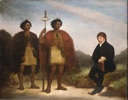The first Europeans
When Westerners first entered the Pacific Ocean, they were amazed that most islands were already populated. They immediately wondered who these people were, where they had come from, and how they had reached such (from their perspective) remote locations. So began a long Western tradition of investigation.
The Cook voyages
James Cook’s three voyages charted the region that became known as Polynesia: the Pacific Islands and New Zealand. Cook also identified the Malayo-Polynesian language family (now known as Austronesian). He and his scientists noted the striking similarities in the physical appearance, customs, mythology and especially languages of the Polynesian peoples, including Māori. This suggested a common and comparatively recent settlement of that region.
Naming Māori
New Zealand’s first settlers were Polynesians who developed their own culture and established different tribal groups. Isolated for centuries, and immersed in their own communities, they had no need for a word to define themselves as a collective group. But by the 1830s, after the arrival of Europeans, the word ‘Māori’ (meaning ‘ordinary people’) was being used to distinguish them from ‘Pākehā’ (‘white people’).
Cook’s observations also suggested that the islanders’ more distant origin lay far to the west – in the ‘Malay’ region or the ‘East Indies’. Australia and South America were ruled out because there were no apparent similarities with the people living there. These views are essentially accepted today.
Greeks, Polynesians and time travellers
The Europeans who followed Cook were often influenced by a popular preoccupation of the time – their own historical links to ancient Greece. In New Zealand, the French explorer Dumont d’Urville saw, in ‘spontaneous comparison’, Greek towns and landscapes and characters, including a seaborne war party that resembled the ‘victors of Troy’.
Placing the origins of Māori and Pacific people in Europe or western Asia was an intellectual tradition that lasted well into the 20th century. Polynesians were often regarded as living archives who might reveal clues about ancient European peoples. Some commentators saw their travels as a voyage back in time, to witness ancient versions of themselves. In contrast, today’s understanding is that while the first inhabitants of Polynesia had their origins in the region of the South China Sea, Polynesian culture developed within Polynesia itself.
Missionaries and lost tribes
Evangelical Christian missionaries had a biblical interpretation of history, in which all people were the descendants of Noah after the Great Flood. They held that the ‘less degraded savages’, including the people of Polynesia, had descended from Noah’s preferred son Shem, while the ‘utterly degraded’ Papuans and Australian Aborigines were the progeny of his less-favoured son Ham.
The missionary Samuel Marsden was possibly the first to propose Jewish or Semitic (meaning descendants of Shem) origins for Māori. Drawing on his observations of their capacity for trade, as well as some of their religious practices, he suggested that Māori had ‘sprung from some dispersed Jews’. 1 Thomas Kendall, another missionary, detected Old Testament ideas in Māori beliefs and carvings and, using the 1797 edition of the Encyclopaedia Britannica, found Pythagorean concepts in Māori cosmology. He suggested Māori originated in Egypt, though he did not claim they were Jews. But many other missionaries in New Zealand and the Pacific Islands spread the notion that the peoples of Polynesia derived from one of the Lost Tribes of Israel. It was an argument that Māori sometimes turned to their own uses, claiming that they were among God’s chosen people.



